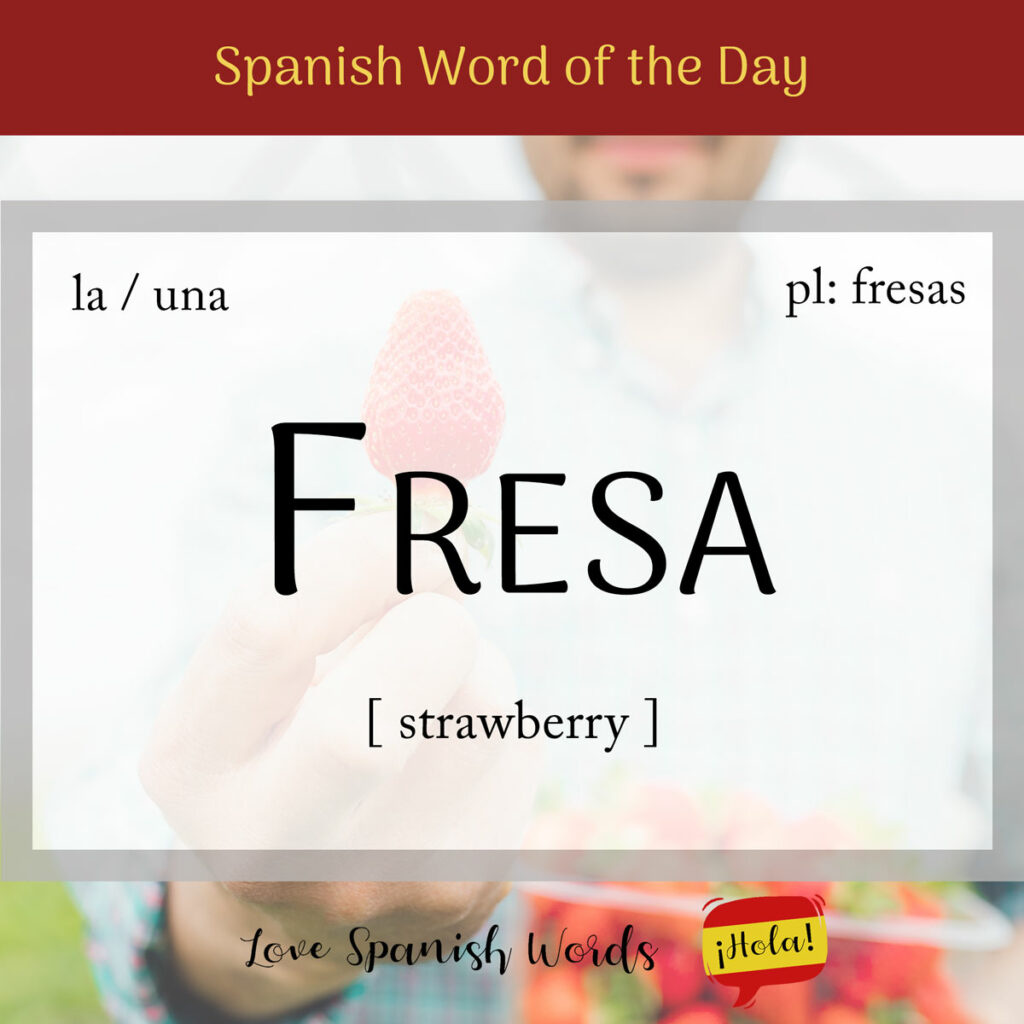When my son wakes up in the morning, the first thing he asks for is his breakfast (desayuno), which usually consists of cereal (cereales), a few slices of banana (plátano), and one or two sliced-up strawberries. A strawberry in Spanish is known as fresa.
Latin American Pronunciation
European Pronunciation

The word was borrowed from the French fraise of the same meaning, which can be traced back to the Latin frāga, the plural of frāgum. This term is related to the Latin verb fragare, which means to smell good or to be fragrant. It received its name thanks to the pleasant aroma and characteristics of the strawberry.
Fresa is a feminine noun, so it takes the following definite and indefinite articles:
- la fresa = the strawberry
- las fresas = the strawberries
- una fresa = a strawberry
- unas fresas = some strawberries
Fresa can refer, not only to the juicy red fruit, but also to the plant that produces it. A strawberry bush can also be described as an arbusto de fresa.

Fun Fact: Fresas are not considered true berries like arándanos (blueberries), tomates (tomatoes), and aguacates (avocadoes). True berries have their seeds enclosed within the fruit. The fresa’s seeds are on the exterior.
That being said, fresas silvestres (wild strawberries) are classified as one of many frutos del bosque (fruits of the forest) which include arándanos (blueberries), frambuesas (raspberries), and moras (blackberries).
There are different types of strawberries. The most commercial one we see and consume is the red fresa commonly seen at supermarkets. Its botanical name is fragaria x ananassa. Below are a few other types of strawberries with their botanical and commercial names.
- fresa silvestre = wild strawberry (fragaria vesca)
- fresa de Virginia = Virginia strawberry (fragaraia virginiana)
- fresa almizclera = musky strawberry (fragaria moschata)
- fresa chilena = Chilean strawberry/beach Strawberry (fragaria chiloensis)
Compré unas fresas dulces y jugosas en el mercado.
I bought some sweet and juicy strawberries at the market.
In the kitchen, it’s common to use strawberries in batidos de fresa y plátano (strawberry and banana milkshakes). Tarta de fresa (strawberry tarte) and magdalenas de fresas (strawberry cupcakes) are also popular desserts using fresas. Another way people eat strawberries is frescas (fresh) and mixed with yogur (yogurt) or as fresas cubiertas de chocolate (chocolate-covered strawberries). Here are a few other popular strawberry treats:
- fresas con nata = strawberries with cream
- leche de fresa = strawberry milk
- helado de fresa = strawberry ice cream
- mermelada de fresa = strawberry jam
- pastel de fresas con crema = strawberry shortcake
Me preparé un batido saludable de fresa con plátano y espinacas.
I prepared myself a healthy strawberry milkshake with banana and spinach.
Fresas are celebrated for being highly nutritivas (nutritious) and offering numerous beneficios para la salud (health benefits). They are abundant in vitaminas (vitamins) and minerales (minerals), packed with antioxidantes (antioxidants), and rich in fibra (fiber).
Strawberries are antiinflamatorias (anti-inflamatory), have heart health benefits and help regular la azúcar en la sangre (regulate blood sugar).
Me gusta comer fresas porque son buenas para la salud.
I like to eat strawberries because they are good for health.

There is a common synonym for fresa – frutilla – which is primarily used in the southernmost areas of South America, known as the Southern Cone. It literally means “little fruit”!

Fresa also has a couple of technical definitions that are completely unrelated to the fruit. The first is drill, such as the kind used by a dentist, and the second is milling cutter, a type of cutting tool used to perform milling operations. A strawberry birthmark may also be called a marca de fresa in informal Spanish, with the medical term being hemangioma infantil.
Colloquial expressions featuring ‘fresa’
Ser fresa is a popular expression used throughout Latin America, referring to a person who is considered superficial, a show-off, or has an elitist attitude. It’s a culturally and socially accepted term used by the younger generations. It has a lot to do with classism and it’s often associated with the rich class, the ones who dress, look, and speak well.
Fresas are recognized for their distinctive way of dressing and speaking. They often use expressions like Oh my God and o sea, along with other specific filler words (muletillas). They typically speak in a certain tone and frequently blend English words into their sentences. This style of speaking is comparable to the “valley girl” stereotype in the United States, characterised by the frequent use of phrases such as like and O.M.G.
This term is used by those who consider themselves fresas and they are proud of it. The lower class also casually uses the word to describe or refer to fresas. However, it also has a negative connotation. Often it’s used as a way to insult, criticise, and imply that someone is superficial, pretentious, or a snob.
Using the diminutive form fresita turns it into an endearing term to refer to someone who takes care of their appearance or is just a little smug or a bit of a show-off.
Aunque vive en barrio feo, actúa como si fuera fresa.
Although she lives in an ugly neighborhood, she acts as if she were strawberry (an elite).
Idiomatic expressions featuring ‘fresa’
Ser la fresa del pastel
Literal translation: to be the strawberry on the cake
English meaning: to be the final touch or final detail to make something perfect (the English equivalent of to be the cherry on top)
Estar fresa / vestirse fresa
Literal translation: to be strawberry (to be “strawberried”)
English meaning: to be well dressed, look nice, or fancy (looking rich or elite)
Hablar fresa
Literal translation: to speak strawberry
English meaning: to speak in a way that fresa people do, and use English words in your speech as well as certain muletillas (filler words: o sea, güey, oh my God)

